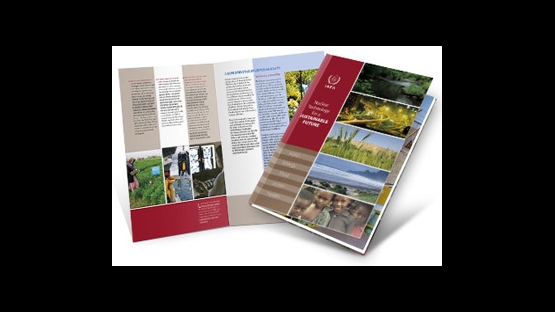Every day, millions of people throughout the world benefit from the use of nuclear technology. From Africa to Asia and from Europe to the Americas, nuclear technologies are used daily to find and protect sustainable sources of fresh water, produce energy and food, while providing researchers the tools to study the ocean's past and predict its future.
As the world's attention turns to Rio de Janeiro, Brazil, for the United Nations Conference on Sustainable Development (dubbed "Rio+20"), an IAEA brochure highlights ways in which the Agency contributes to the development goals being addressed at this global conference. The brochure entitled IAEA at Rio+20: Nuclear Technology for a Sustainable Future also provides an overview of the many ways in which nuclear technology is contributing to ensuring peace, health and prosperity throughout the world.
"Sustainable development requires international cooperation and the effective use of technology," says IAEA Director General Yukiya Amano. "The IAEA helps its Member States to use nuclear technology for a broad range of applications, from generating electricity to increasing food production, from fighting cancer to managing fresh water resources and protecting the world's seas and oceans."
Through its extensive Technical Cooperation programme, the IAEA also helps to make these benefits available to developing countries. For instance, the IAEA provides assistance in areas such as human health (through the Programme of Action for Cancer Therapy), animal health (the IAEA was an active partner in the successful global campaign to eradicate the deadly cattle disease rinderpest), food, water and the environment.
Nuclear technology is contributing to "building the future we want" in several areas:
Population growth, accelerating economic development, and changing lifestyles demand ever more resources. Resource overuse has begun to compromise "natural services" such as biodiversity, clean air, fresh water and arable land; a trend that threatens the sustainability of development. To help Member State governments gain greater adaptability the IAEA has developed a new methodology for modelling these complex interactions called CLEWS (Climate, Land-use, Energy and Water Strategies) that allows simultaneous and cohesive analysis of all these areas.
Increased access to sufficient, safe water is made possible through nuclear techniques that map groundwater resources more affordably and quickly than any other means. Nuclear techniques also improve the efficiency of irrigation systems, which uses 70% of all fresh water resources.
Access to affordable energy directly improves human welfare. Current projections foresse electricity demand growing by 60 to 100% by 2030. As a low carbon source of energy, nuclear power can mimimize greenhouse gas emissions and mitigate the negative impacts of climate change. The IAEA helps countries using or introducing nuclear power to do so safely, securely, economically and sustainably. Its safety standards, assistance and reviews increase safety. The IAEA also verifies that nuclear energy is only used for peaceful purposes, directly contributing to peace and security.
Access to sustainable sources of food will remain a preeminent challenge in the decades to come. Based upon current practice and consumption, agricultural production will have to increase by about 70% by 2050 to meet demand. Nuclear techniques are used in developing countries to increase production sustainably by breeding improved crops, enhancing livestock reproduction and nutrition, as well as controlling animal and plant pests and diseases. Post-harvest losses can be reduced and safety increased with nuclear technology. Soil can be evaluated with nuclear techniques to conserve and improve soil productivity and water management.
To better understand and protect oceans, nuclear techniques are used to monitor the ocean's shifting chemical balance caused by ocean acidification that can stunt and endanger coral and microorganisms' growth. Nuclear techniques are also powerful tools used to acquire an accurate picture of the ocean's distant past.
Health for millions of patients relies upon the safe and effective diagnosis and treatment of disease. Nuclear techniques provide precise diagnostic information that is of vital importance in detecting and curing both infectious and non-communicable diseases such as cancer. Radiopharmaceuticals are used to treat disease and to enable diagnostic imaging. Radiotherapy also employs focused radiation beams that are essential in curing diseases. In the developing world, infectious and non-communicable diseases, as well as malnutrition, create a socio-economic burden that threatens sustainability. The safe, well-coordinated use of nuclear techniques to detect, diagnose and treat disease and to combat malnutrition contributes to improved health and social stability throughout the world.
"The IAEA contributes to the development of global policies that address the energy, food, water and environmental challenges that the world currently face," the Director General concluded. "We look forward to making Rio+20 a success."
The brochure IAEA at Rio+20: Nuclear Technology for a Sustainable Future is available here [pdf]


